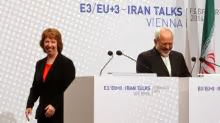U.S. Official: No Formal, Written Framework on Iran Nukes, ‘But We All Know What It Is’
February 21, 2014 - 4:25 AM
European Union foreign policy chief Cathy Ashton and Iranian Foreign Minister Mohammad Javad Zarif speak briefly to the press after closed-door nuclear talks in Vienna, Austria on Thursday, Feb. 20, 2014. (AP Photo/Ronald Zak)
(CNSNews.com) – Closed-doors talks between Iran and six world powers ended in Vienna Thursday with a reported agreement on a “framework” for resolving the long nuclear standoff, but nothing has been put down on paper. Nevertheless, a senior U.S. official insisted that “we all know what it is.”
“We are trying to do this in as open and transparent a manner as possible, but for any negotiation to succeed it is critical to leave space for everyone’s points of view to be properly heard and taken into account,” said the administration official, briefing reporters in the Austrian capital on condition of anonymity.
“So you won’t see a formal, written-down framework or agenda, but we all know what it is and everything is referred to in some way in the Joint Plan of Action” – the interim deal reached last November.
The official said that Iran and its negotiating partners – the U.S., Russia, China, Britain, France and Germany, collectively known as the P5+1 – have “agreed on how we’re going to proceed, what topics we’re going to address” in the talks, due to resume on March 17-20.
Similarly, European Union foreign policy chief Cathy Ashton, convener of the talks, announced in a brief statement that during the three days of talks “we have identified all of the issues we need to address in reaching a comprehensive and final agreement.”
In the absence of anything written down, however, it immediately became apparent that Iran and the U.S. at least have different views on what the agenda is meant to cover, including the question of Tehran’s ballistic missiles, which could potentially be used to deliver nuclear payloads.
Iran’s top negotiator, Foreign Minister Mohammad Javad Zarif, told Iranian journalists that his delegation had refused to discuss “defensive” issues – a reference to its missile program. Moreover, he suggested that the other parties had consented to this.
“Everyone has accepted that Iran’s defensive capability is no subject for the negotiations,” the semi-official Fars news agency quoted Zarif as saying in Vienna after the talks ended.
But the senior U.S. official did not agree that ballistic missiles would not be covered in the negotiations.
“I’m not going to speak to any particular item,” the official said in response to a question about the missile issue. “What I’m going to say is what you will hear me say repeatedly, which is every issue of concern to us has been discussed, will be discussed, is on the table.”
The attempt to negotiate a comprehensive nuclear deal flows from the Joint Plan of Action (JPOA), an interim accord reached in Geneva that grants Iran some sanctions relief in exchange for limited curbs on its nuclear program.
P5+1 negotiators did not include any direct reference to the missiles in the JPOA, but the text does say that applicable U.N. Security Council resolutions are to be dealt with as part of a comprehensive agreement. Most of those resolutions – five out of six – do cite the ballistic missile threat.
“The Joint Plan of Action lays out elements for a comprehensive agreement,” the U.S. official said. “It talks about all concerns needing to be addressed. It talks about the U.N. Security Council resolutions needing to be addressed.”
‘We won’t close any site’
During the background briefing, the administration official stated repeatedly that the bottom line for the U.S. is to ensure that Iran “cannot obtain a nuclear weapon,” and that the international community has confidence that its nuclear program is “entirely peaceful.”
Early this month, the chief U.S. negotiator in the P5+1 talks, Undersecretary of State Wendy Sherman, told lawmakers that in the event of that objective being reached in a final agreement, the fact Iran has a missile capability would be rendered “almost irrelevant.”
“If we are successful in assuring ourselves and the world community that Iran cannot obtain a nuclear weapon,” Sherman told the Senate Foreign Relations Committee, “then them not having a nuclear weapon makes delivery systems almost – not entirely, but almost – irrelevant.”
In his remarks to Iranian journalists Thursday, Zarif also said his delegation had made it clear during the three days of talks that Iran will not shut down any nuclear facility.
“We won’t close any site and have announced that no one should prescribe anything or dictate a solution to the Iranian nation,” he said. “The way to ensure the peaceful nature of our program is not closing the sites, rather its peaceful nature should be displayed openly, transparently and based on the international regulations and supervision.”
Iran’s known nuclear-related facilities of greatest concern to Western governments include a plutonium reactor under construction at Arak and an underground uranium-enrichment facility at Fordo. At a military complex at Parchin, near Tehran, the U.S. suspects that high explosive components for a nuclear weapon have been tested.
Sherman told the Senate committee on Feb. 4 that “Iran does not need” either the Fordo or Arak facilities in order to have a peaceful nuclear program.






No comments:
Post a Comment